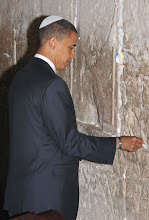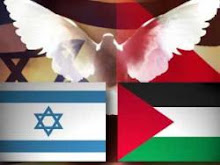 The Facts: 8/25/09: Heralding an impending announcement by the Obama administration of an Arab-Israeli deal for the renewal of peace talks, the Guardian reports that “Israel, in return for a deal on settlements, is seeking not only a tougher line over Iran but normalisation of relations with Arab states, such as overflight rights for its airline El Al, establishment of trade offices and embassies, and an end to the ban on travellers with Israeli stamps in their passports.
The Facts: 8/25/09: Heralding an impending announcement by the Obama administration of an Arab-Israeli deal for the renewal of peace talks, the Guardian reports that “Israel, in return for a deal on settlements, is seeking not only a tougher line over Iran but normalisation of relations with Arab states, such as overflight rights for its airline El Al, establishment of trade offices and embassies, and an end to the ban on travellers with Israeli stamps in their passports."Bahrain, Qatar, the United Arab Emirates and Morocco have so far tentatively agreed. Saudi Arabia has refused, saying Israel has had enough concessions. But the US is taking comfort from the fact that, crucially, Saudi Arabia has not tried to block other Arab states from signing up. 'They may come on board last, but they will come on board,' a European official said [of the Saudis]. A coalition of Arab states, thought to include the Saudis, has been in secret contact with Israel to discuss what they see as a common threat posed by Iran." (Barack Obama on brink of deal for Middle East peace talks, Guardian, 8/25/09)
8/14/09: “The United States told Israel last week that Gulf states Oman and Qatar are willing to renew their relations with Israel if it agrees to a moratorium on construction in the West Bank… Israel's embassy in Oman was shut down in 2001 after the outbreak of the second intifada. Qatar had an Israeli delegation office, which was also shut down.” (Oman, Qatar: We'll renew Israel ties if it freezes settlements, Ha’aretz, Aug. 14, 2009)
At the same time, press reports indicate that the Saudis are not inclined to show intermediate steps towards normalization with Israel in exchange for an Israeli settlement freeze. Instead, "Riyadh wants an Israeli-Palestinian peace agreement to precede its Arab peace plan offer for normalization of relations between Israel and 23 Arab states."
8/19: Two prominent Israelis, Shai Feldman and Gilead Sher, write in “The grand bargain that is the Mideast’s best hope,” Financial Times, Aug. 18, 2009: “The reluctance of Saudi Arabia’s Prince al-Faisal to reward a partial Israeli move such as a settlement construction freeze is understandable given the distrust between Israel and its neighbours. The failure to end the conflict through interim stages has made all parties sceptical about such steps being more than temporary.
"Instead what is proposed here is that the Arab states engage Israel in an exercise in reverse engineering: announcing that once Israel reaches an agreement with the Palestinians on a permanent resolution of the dispute, the Arab states would reward Israel for every step it took towards implementing this vision.”
(Professor Shai Feldman is director of the Crown Center for Middle East Studies at Brandeis University. Gilead Sher, one of Israel’s most prominent lawyers, was its chief negotiator and is author of Within Reach: The Israeli-Palestinian Peace Negotiations 1999-2001).
8/3/09: "Saudi Arabia’s negative public comments, other officials said, bear little relation to what it is saying in private. Mr. Mitchell insisted he was getting a very different message in his private meetings with more than a dozen Arab leaders, including the Saudis. Many, he said, were ready to consider new measures.
"He declined to discuss what kinds of steps, but other officials said the United States was pushing for a package of measures ranging from Arab countries’ opening commercial offices in Tel Aviv to their leaders’ granting interviews to Israeli journalists. Another step would be getting Arab nations to allow Israel’s state carrier, El Al, to fly over Arab countries to cut flight times to Asia." (New York Times, 8/3/09, U.S. to Push Peace in Middle East Media Campaign)
Israel has not been willing to agree to a full settlement freeze as requested by the US and the international community, and as required by the Road Map, insisting that it will continue to build Jewish housing in Palestinian Arab neighborhoods in East Jerusalem and Israeli settlements in the West Bank, including those in heavily populated Palestinian areas which have no chance of becoming part of Israel under a future peace accord.
The Arab states are rightly skeptical that even if Israeli Prime Minister Netanyahu agreed to a partial freeze on settlement building, he will not agree to negotiate the establishment of a Palestinian state on fair terms. The Israeli press has reported that various people close to Netanyahu have said that he agreed to pay lip service to a two-state solution, but under terms that he knew the Palestinians and the Arab world would never accept. Netanyahu's long-standing opposition to a two-state solution, with a territorially contiguous Palestinan state in the West Bank and Gaza, makes such skepticism well-founded. Under such circumstances, it is not surprising that Netanyahu has not inspired the kind of confidence and trust that would enable Arab leaders to begin an incremental process of normalization with Israel.
"Arab leaders are concerned that if they offer normalization, they will be embarrassed by new Israeli construction in Palestinian neighborhoods in East Jerusalem, which the entire international community and the Arab world believe should become part of a Palestinian state: 'One of the main [reasons] Arabs are saying they can't go very far' in showing possible reciprocal gestures to Israel, said Daniel Levy of the New America Foundation, 'is, [they say], ‘what worries us most, will you guarantee that the Israelis won't embarrass us?'" Levy explained that Arab governments are afraid they will show reciprocal gestures only to have Al Jazeera showing pictures of new Jewish settlement building in East Jerusalem and the West Bank.
"When Israel's new ambassador to Washington Michael Oren was at the State Department July 17 for a "getting to know you" session, State Department officials raised with him among other topics Washington's opposition to Israel having recently granted permission for a 20-year old plan for construction of 20 Jewish apartments at the site of the old Shepherd Hotel in a Palestinian neighborhood of East Jerusalem, JTA's Ron Kampeas reported.
"The Saudis could point to the planned Israeli construction in East Jerusalem as an example of the reason Arab states feel they could be publicly embarrassed if the United States doesn't get Israel to agree to a settlement freeze first, a Washington Middle East peace activist who asked to speak anonymously said. 'The Saudis could point to that and say, ‘President Obama, we believe you are serious; but until you have the Israelis under control, you can't expect us to act.'"
Still, some Arab leaders may agree to President Obama’s proposal to make some normalization gestures towards Israel in order to help foster a positive climate for the President’s push to renew negotiations for a comprehensive Arab-Israeli accommodation.
"A high-ranking Arab official quoted in the Asharq Al-Awsat report said that while Arab states 'will not reject the US request,' they intend to respond with certain conditions. First, he said, Arab states will wait to check that US moves bear fruit, especially in terms of bringing about a halt to settlement construction. He emphasized that normalization would only come after Israel ceases construction in the West Bank. Additionally, the official said that Arab states would push for Israel to improve living standards of West Bank Palestinians.
"The official went on to point out that in the last 15 years, many Arab states had improved trade and semi-diplomatic relations with Israel. The Arab stance, according to the official quoted by Asharq Al-Awsat, would not constitute a unified front, and individual states will be free to respond to US requests however they please. (Jerusalem Post, 7/30/09, “Normalization when construction stops).
Bahrain: "Last Sunday, Bahrain's Crown Prince Shaikh Salman bin Hamad al-Khalifa called in the Washington Post for Arabs to talk to Israelis. 'Our biggest mistake has been to assume that you can simply switch peace on like a light bulb," al-Khalifa wrote. "The reality is that peace is a process, contingent on a good idea but also requiring a great deal of campaigning -- patiently and repeatedly targeting all relevant parties. This is where we as Arabs have not done enough to communicate directly with the people of Israel. [...] We must stop the small-minded waiting game in which each side refuses to budge until the other side makes the first move. We've got to be bigger than that. All sides need to take simultaneous, good-faith action if peace is to have a chance.'" Mitchell's planned visit to Bahrain this week would seem to indicate Washington's interest in exploring ways to advance the crown prince's call for simultaneous, good faith action.
Qatar, Tunisia, other Arab countries: "American officials have been approaching other Arab states who may be more amenable to such overtures. Israel and the United States have floated a variety of ideas: Qatar might reopen the Israeli trade office it shuttered in January to protest Israel's military offensive in Gaza. Tunisia and other countries might allow Israeli planes to use their airspace. Arab leaders also might grant interviews to Israeli journalists, an Israeli government idea that the crown prince of Bahrain publicly endorsed last week, saying that Arab nations should 'tell our story more directly to the Israeli people by getting the message out to their media.'"
Quotes from Laura Rozen, The Cable, Foreign Policy magazine blog, 7/27/09)





